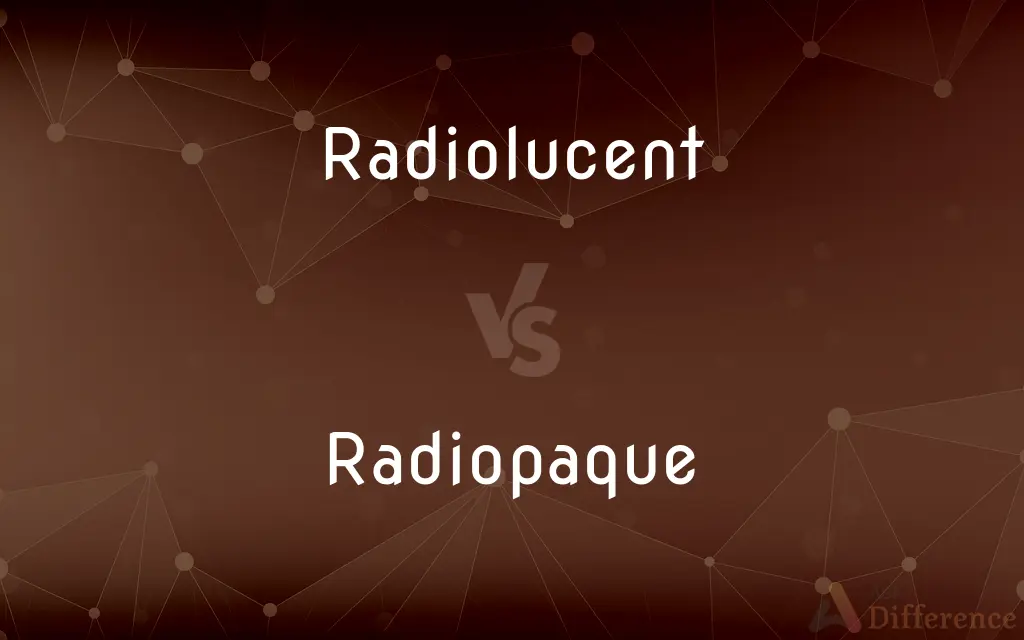Radiolucent vs. Radiopaque — What's the Difference?
By Tayyaba Rehman — Updated on October 9, 2023
Radiolucent materials allow X-rays to pass through, appearing dark on images. Radiopaque materials block X-rays, appearing white. The difference is their X-ray absorption capability.

Difference Between Radiolucent and Radiopaque
Table of Contents
ADVERTISEMENT
Key Differences
In the realm of medical imaging, especially with X-rays, the terms Radiolucent and Radiopaque play crucial roles. Radiolucent materials are those that allow X-rays to pass through them with ease. When an image is taken, these materials don't absorb the X-rays much and appear darker on the radiograph. On the other hand, Radiopaque substances are quite the opposite. They absorb the X-rays and hence, appear whiter or brighter on the X-ray image.
Tayyaba Rehman
Oct 09, 2023
To understand this in an everyday context, consider the X-rays of a limb. Bones, being dense and hard, are Radiopaque, which means they appear white on the X-ray because they absorb the rays. However, the surrounding soft tissues, which let the X-rays pass through them more easily, are Radiolucent, resulting in a darker appearance on the X-ray image.
Tayyaba Rehman
Oct 09, 2023
In essence, Radiolucent and Radiopaque are antonyms in the context of radiology. They define how materials or tissues interact with X-rays, determining the resulting appearance on the radiographic image. This distinction aids medical professionals in accurate diagnoses and treatment planning.
Tayyaba Rehman
Oct 09, 2023
Another perspective involves the use of contrast agents in medical procedures. Often, during certain diagnostic tests, a Radiopaque contrast agent is introduced into the body to highlight specific areas, as these agents will appear white on the X-ray, providing a clear distinction from the surrounding Radiolucent tissues, which appear darker.
Tayyaba Rehman
Oct 09, 2023
Comparison Chart
ADVERTISEMENT
Use in Medical Imaging
To identify less dense areas
To highlight dense areas or specific regions of interest
Tayyaba Rehman
Oct 09, 2023
Definitions
Radiolucent
Radiolucent refers to materials that allow X-rays to pass through them.
The air in the lungs is radiolucent, appearing dark on an X-ray.
Tayyaba Rehman
Oct 09, 2023
ADVERTISEMENT
Radiopaque
Radiopaque substances appear as lighter or white areas on X-ray images.
The radiologist pointed out the radiopaque lesion on the patient's radiograph.
Tayyaba Rehman
Oct 09, 2023
Radiolucent
Radiolucent describes the quality of certain tissues or objects in allowing easy passage of X-rays.
The silicone implant was mostly radiolucent, making surrounding tissues visible.
Tayyaba Rehman
Oct 09, 2023
Radiopaque
Radiopaque denotes high absorption of X-ray beams.
The contrast agent used was radiopaque, highlighting the vascular structures.
Tayyaba Rehman
Oct 09, 2023
Radiolucent
Radiolucent denotes minimal absorption of X-ray beams.
Soft tissues are generally radiolucent, providing contrast against bones.
Tayyaba Rehman
Oct 09, 2023
Radiopaque
Radiopaque materials often contain elements like iodine or barium that impede X-rays.
The radiopaque dye illuminated the coronary arteries during the angiogram.
Tayyaba Rehman
Oct 09, 2023
Radiolucent
Radiolucent substances result in darker areas on radiographic images.
The physician identified a radiolucent cyst in the patient's X-ray.
Tayyaba Rehman
Oct 09, 2023
Radiopaque
Radiopaque materials block or absorb X-rays, preventing their passage.
The metal screws were radiopaque, appearing bright white on the X-ray.
Tayyaba Rehman
Oct 09, 2023
Radiolucent
Radiolucent materials lack high-density elements that block X-rays.
The radiolucent nature of the plastic spacer was evident in the imaging.
Tayyaba Rehman
Oct 09, 2023
Radiopaque
Radiopaque describes the quality of certain substances in blocking X-rays, aiding in medical imaging.
Thanks to the radiopaque marker, the surgical site was easily identified.
Tayyaba Rehman
Oct 09, 2023
Radiolucent
Allowing the passage of x-rays or other radiation; not radiopaque.
Tayyaba Rehman
Apr 17, 2018
Radiolucent
Almost complete transparent to X-rays or other forms of radiation;
Radiolucent tissues
Tayyaba Rehman
Apr 17, 2018
Radiopaque
Not transparent to X-rays or other forms of radiation;
Barium sulfate is radiopaque
Tayyaba Rehman
Apr 17, 2018
FAQs
Why are contrast agents in medical procedures usually radiopaque?
They're radiopaque to highlight specific areas on X-rays, contrasting against the darker, radiolucent tissues.
Tayyaba Rehman
Oct 09, 2023
Is bone radiolucent or radiopaque?
Bone is radiopaque, appearing white on an X-ray due to its density.
Tayyaba Rehman
Oct 09, 2023
What does radiolucent mean?
Radiolucent refers to materials that allow X-rays to pass through, appearing dark on images.
Tayyaba Rehman
Oct 09, 2023
Do all radiopaque materials appear equally bright on X-ray?
No, the brightness varies based on the material's density and X-ray absorption capability.
Tayyaba Rehman
Oct 09, 2023
How does radiopaque appear on an X-ray?
Radiopaque materials absorb X-rays and appear white or bright on an X-ray image.
Tayyaba Rehman
Oct 09, 2023
Why might a surgeon be concerned with radiopaque materials during a procedure?
Radiopaque materials, like surgical instruments, are visible on X-rays and can help in guiding the procedure or ensuring no foreign objects remain post-surgery.
Tayyaba Rehman
Oct 09, 2023
Can a material be both radiolucent and radiopaque?
No, the terms are opposites; a material is either radiolucent or radiopaque based on its X-ray absorption.
Tayyaba Rehman
Oct 09, 2023
How does radiolucent help in medical imaging?
Radiolucent areas provide contrast, helping identify less dense tissues or abnormalities.
Tayyaba Rehman
Oct 09, 2023
What common objects are radiolucent?
Objects like air, water, and many plastics are generally radiolucent.
Tayyaba Rehman
Oct 09, 2023
Are radiopaque contrast agents safe?
Generally, they are safe, but some patients may have allergic reactions or other side effects, which is why physicians screen patients beforehand.
Tayyaba Rehman
Oct 09, 2023
Author Spotlight
Written by
Tayyaba RehmanTayyaba Rehman is a distinguished writer, currently serving as a primary contributor to askdifference.com. As a researcher in semantics and etymology, Tayyaba's passion for the complexity of languages and their distinctions has found a perfect home on the platform. Tayyaba delves into the intricacies of language, distinguishing between commonly confused words and phrases, thereby providing clarity for readers worldwide.

















































